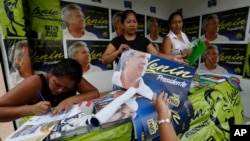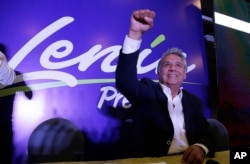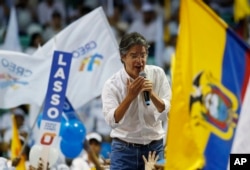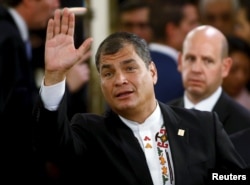Ecuador until recently looked like the next domino to fall in a right-wing resurgence in Latin America. Trapped in recession and disgusted by corruption scandals, voters seemed poised to kick out the leftists who have ruled for a decade and hand power to conservative banker Guillermo Lasso.
But the race has grown tight thanks to a late surge by President Rafael Correa's hand-picked successor, Lenin Moreno, who was named - to the delight of allies and foes alike - for the father of Russian communism.
With both campaigns warning of election-day fraud on Sunday, and the slow pace of vote counting during the Feb. 19 first round still fresh in people's minds, the stage looks set for a degree of volatility unseen in this South American nation in 15 years. Authorities have beefed up security outside the national electoral council's headquarters, and local church officials recently appealed to both candidates to accept the results.
Several polls released last week give Moreno, Correa's one-time vice president, a slight edge. The polling firm Cedatos, which accurately predicted the first-round result, put Moreno ahead for the first time since its runoff surveys began. The March 21 poll gave Moreno 52 percent to 48 percent for Lasso, an almost mirror-image of Lasso's lead in a poll by Cedatos last month. Both poll results are within the margin of error, however, suggesting a dead heat.
While Moreno bested Lasso by more than 10 points in the eight-way first round, Lasso was seen as the strong favorite to win the runoff as more than 60 percent of voters opted for candidates opposed to continuing what Correa calls his "Citizens Revolution.''
But since then, Lasso has seen his support fall as poor voters take a second look at his past business activities, spurred on by almost daily attacks from Correa, who accuses Lasso of profiting from the country's 1999 banking crisis.
Through a trust, Lasso is a major shareholder of Banco Guayaquil, one of the nation's biggest lenders. During the late 1990s, he led an aggressive strategy of purchasing on the cheap IOUs given to depositors who had their savings frozen to avert a bank run amid soaring inflation. The government later bought the certificates back at full value, handing investors like Lasso a huge profit.
Some of his gains were then shuttled to offshore tax havens, according to documents in an investigation by Argentine newspaper Pagina/12. Correa recently said tax authorities are investigating Lasso for the almost two-decade-old transactions.
Lasso has rejected the accusations as part of a slander campaign, saying he hasn't hidden any assets.
Even if not illegal, Lasso's dealings don't sit well in the traditional Santa Clara market in downtown Quito, where many worry that if he is elected, he will turn back the clock on social spending that surged under Correa. The self-declared 21st century socialist took office in 2007, ushering in a period of stability marked by a reduction in inequality and major buildout of hospitals and schools serving the poor.
"Lenin is with us poor folks,'' says 51-year-old fruit and vegetable vendor Margarita Sambuche. "With this government we've had free education, free health care, free uniforms - everything we poor people need.''
Lasso's supporters say he has been unfairly hounded because of his wealth. Leaving a soccer game this week, he was attacked by Moreno supporters throwing stones and other objects.
"Excessive wealth in a country marked by inequality and huge poverty isn't a very good business card,'' said Pablo Ospina, a political scientist at the Univerisdad Andina in Quito.
Maria Pazmino is among few storekeepers in the Santa Clara market who openly supports Lasso, flying a white and blue flag - the colors of his CREO party. She blames Correa for rising taxes that have eroded profits from her small vegetable stall.
"Correa has us poor people screwed, but unfortunately the others don't see it,'' she says.
The election results will be watched closely in Latin America, where conservative leaders in Argentina, Brazil and Peru have assumed power in the past 18 months after the end of a commodities boom that helped elect leftists like Correa.
Interest outside the region focuses mostly on what the results will mean for WikiLeaks founder Julian Assange and his ability to remain at Ecuador's embassy in London. Lasso has said he will evict the Australian activist within 30 days of taking office while Moreno says he will allow him to stay.
While Lasso has benefited from ongoing corruption allegations related to bribes Brazilian construction giant Odebrecht paid and a $12 million contracting scandal at state-run PetroEcuador, analysts say he has not connected with lower-income voters.
Meanwhile Moreno, who has used a wheelchair since he was shot in the back and paralyzed from the waist down during a 1998 robbery, is remembered fondly for his work on behalf of the nation's disabled and is seen as a less dogmatic version of Correa. He may also be benefiting indirectly from the victory of U.S. President Donald Trump, whose anti-immigrant rhetoric Correa predicted more than a year ago would re-energize the region's leftists.
Whoever wins will likely face tough economic choices.
Correa, who is barred by the constitution from seeking re-election, managed to soften the blow from plunging oil prices in the OPEC nation by spending heavily on infrastructure. But the bill is coming due, and with few engines of growth in the dollarized economy, the next president might have to slash the budget or turn to the International Monetary Fund to finance one of the region's highest deficits.







